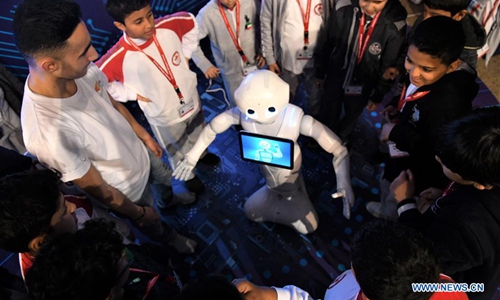Number of AI firms grew by 45%
By Yin Yeping Source: Global Times Published: 2020/8/26 17:03:40
China takes the lead in AI innovation and application, despite rising pressure from the US

Children interact with a robot at the Robotics and Artificial Intelligence (AI) Festival in Hawalli Governorate, Kuwait, on Feb. 9, 2020. Kuwait launched on Sunday the Robotics and Artificial Intelligence (AI) Festival to promote the scientific awareness in Kuwait. (Photo by Ghazy Qaffaf/Xinhua)
Despite ongoing pressure exerted by the US government on China's high-tech sector in a bid to create barriers to development, the Chinese government and Chinese tech companies have not been disrupted. Instead they are accelerating research and innovation with a major focus on improving people's livelihoods and boosting economic growth, including prevention and control of the epidemic.
A recent report titled Emerging Military Technologies: Background and Issues for Congress published by the Congressional Research Service addressed the fact that China is widely viewed as the US' closest competitor in the international AI market.
China's management of its AI ecosystem stands in stark contrast to that of the US, the report said, claiming that the Chinese government has a direct means of guiding military AI development priorities and accessing technology developed for civilian purposes.
China does own the rights to adapt AI technologies in various sectors, including for military use, but the US government has deliberately taken a one-sided view of the development of China's AI, experts say.
The Trump administration, famous for embracing unilateralism, is squeezing China on AI development based on political bias and the so-called China threat theory.
Despite the US' tough stance and blatant moves targeting Chinese AI firms, Chinese companies' level of participation in AI hasn't changed.
China had added more than 210,000 new AI-related enterprises by Wednesday, up 45 percent from last year, according to a corporate database compiled by data tech company Tianyancha. In terms of geographical distribution, Beijing and South China's Guangdong Province, where more strategic support is in place, are the two regions where AI related companies are most concentrated in the country.
Leading the way
The Trump administration has introduced a series of sanctions on Chinese AI companies since last October, including eight Chinese companies in facial-recognition and AI technology. The move prevents those Chinese entities from buying US products. Firms added to the list include iFlytek, a voice recognition company which, in a recent English-language competition, was again ranked first in the world.
iFlytek said at an event on August 12 that US' move to add the firm to the entity list has not slowed the company's R&D, and the products it supplies to Huawei have surpassed the capability of those from Google in response to concerns about whether the company can continue to maintain its leading global position after being included in the US entity list.
"The US' constant pressure on China over AI is born of the fact that, with advanced AI technologies, Chinese companies will be more competitive on the world stage, but Chinese companies have already been taking the lead in self-developed technologies - even exceeding the US in some areas," Xiang Ligang, a veteran tech industry analyst told the Global Times on Wednesday.
"China ranks second for the most number of AI enterprises in the world and has become the world's largest country for AI investment and financing," Wang Guoyin, vice president of the China Association of Artificial Intelligence, said at an event on Monday. "The proportion of these enterprises' financing in the global total is also rising rapidly.
"The total number of AI papers and the fact that they are highly cited ranks China first in the world," he added. "The number of patents is slightly ahead of the US and Japan."
A drive toward self-development
Over the past decade, China's advantages in data collection and strategic decision-making have narrowed the gap with the US in the AI industry, with companies like Alibaba, Tencent and Baidu taking the lead in the global AI race, say experts.
Against the backdrop of the epidemic, Chinese advanced AI development has been applied in many key areas including the use of facial recognition for detecting suspected COVID-19 patients.
Sally Gao, a sales manager at Wuhan Guide Infrared, told the Global Times on Wednesday that thanks to AI technology, their thermal detector's recognition rate has improved massively - from 80 percent accuracy to more than 95 percent.
"Everyone's body temperature is a bit different, and with AI, we can effectively diagnose whether a person has a fever or not with high accuracy," Gao said, noting that the technology was developed in-house, and based on many years of experience in epidemic prevention. With this outbreak, the technology improved even further.
At present, hundreds of thousands of thermal detectors fitted with the company's AI technology have been delivered to people at home and abroad for fighting the virus.
"AI has been widely adopted in almost every part of our lives, ranging from satellite to auto to mobile phone," said Xiang. "AI can not only be used for militaries such as the US', but also for improving social efficiency and reducing social costs. This has always been one of the core applications in China."
RELATED ARTICLES:
Posted in: MARKETS,BIZ FOCUS